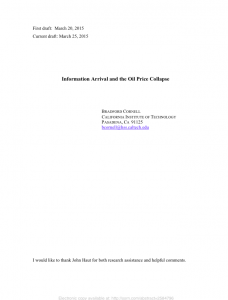Full Title: Information Arrival and the Oil Price Collapse
Author(s): Bradford Cornell
Publisher(s): California Institute of Technology
Publication Date: March 1, 2015
Full Text: Download Resource
Description (excerpt):
The price of West Texas Intermediate Crude (WTI) fell by almost 60% between late July 2014 and March 2015. Assuming that the oil market is relatively efficient, new information must enter the market in order for the price of crude to change more than a minimal amount associated with carrying costs. I use an event study methodology to analyze oil price changes in response to news disclosures over the analysis period. Not surprisingly, I found that most of the news releases coincident with large price movements pointed to positive supply surprises, i.e., supply being greater than expected. However, I also found that, on a significant portion of such days, there was no release of news that contained fundamental information. This is consistent with the price behavior of financial asset markets, which often exhibit large price movements that are not supported by the arrival of new information, and also supports the view that a substantial fraction of oil price movements were instead related to factors such as investor sentiment and momentum trading. The future implications of the recent price collapse suggest that a sharp rebound is possible, but is likely capped by the effects of shale production.
